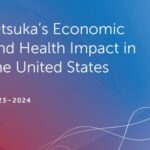NEWS
Supreme Court Ruling on Online Sales Tax Sets Level Playing Field
The Supreme Court’s 5-4 ruling in South Dakota v. Wayfair last weekempowers states to establish a level playing field for the taxation of goods sold by in-state and out-of-state sellers. The court overturned two precedents, dating back to 1967 and 1992, that imposed an artificial physical presence rule on state sales tax systems.
Discussing South Dakota v. Wayfair: Brill on CNBC’s ‘Closing Bell’
On CNBC’s ‘Closing Bell,’ Alex Brill discusses the US Supreme Court’s ruling in South Dakota v. Wayfair, Inc. to require out-of-state sellers to collect the same sales tax that in-state resellers must collect.
What is Behind that Record-Breaking State Unemployment Rate Data?
The Bureau of Labor Statistics recently reported that the US unemployment rate in May 2018 was 3.8%, the lowest since April 2000. During the past 50 years, the US unemployment rate has been this low only 10% of the time.
Charitable Giving and the Tax Cuts and Jobs Act
This paper investigates how the Tax Cuts and Jobs Act affects household charitable giving in the United States. We find that the law will reduce charitable giving by $17.2 billion (4.0 percent) in 2018 according to a static model and $16.3 billion assuming a modest boost to growth.
Waiting for the Supreme Court’s Wayfair Decision
With only about two weeks left in its 2017–2018 term, the US Supreme Court still has 19 cases left to decide. Decisions are expected on a number of key issues, including partisan and racial gerrymandering, public employee union dues, and the travel ban.
The Effects of Tax Reform on the Medical Deduction
Since its inception in 1942, the deduction for qualified medical expenses has offered a type of federally funded insurance to taxpayers who itemize. By allowing the deduction of out-of-pocket medical spending that exceeds a threshold, the deduction is similar to a high-deductible health plan, under which the federal government subsidizes subsequent spending at one’s marginal tax rate.
Election Season is Great Time to Debate Net Neutrality in America
The midterm elections are six months away, and candidates are looking for innovative ways to define their campaigns. With an unemployment rate below 4 percent and recent upward revisions to the 2018 economic outlook, Republicans are preparing to campaign on a strong economy and the tax cuts enacted last December that improved US competitiveness and boosted voters’ after-tax incomes.
SCOTUS Should Balance Main Street and Online
For more than 50 years, the Supreme Court has prevented states from requiring out-of-state sellers to collect sales tax unless the seller has a physical presence, such as a local store or warehouse, in the state in which the sale occurs. Although the out-of-state sellers’ customers are supposed to remit tax on such sales, very few of them do so. As online retail sales continue to grow, states’ annual revenue loss has been estimated to be as much as $33.9 billion in 2018.
MGA’s Alex Brill on CNBC’s Squawk Box
“The trade news is a negative at the moment. Going forward I don’t think this is the way to grow the economy by slapping tariffs on the way that we’ve seen. Whether this is strategic or not is yet to be determined. Whether there will be some grand deal that’s going to be worked. But this is clearly something that should be concerning to employers. Not just those guys who are directly on the list today, but really who is safe? Some industries might be. Maybe it’s the hospitals, some really domestic type industries that don’t care so much about what is happening in our trade patterns. But I think a lot of folks are rightfully concerned about a new uncertainty in public policy.”
Cost of Opioid Crisis to Average Rhode Islander is $2.8K — 6th Highest in U.S.
“‘Opioid abuse is an epidemic in the United States, claiming more than 42,000 lives in 2016 alone (CDC 2017c). In addition to its devastating impact on families and communities, the opioid epidemic is costing the US economy tens of billions, if not hundreds of billions, of dollars annually. The types of costs attributable to opioid abuse – health care costs, criminal justice costs, and lost productivity, for example – are fairly well understood, as is the economic impact of the crisis at the national level,’ writes the report which was authored by Alex Brill of the American Enterprise Institute and Scott Ganz of Georgia Institute of Technology.”
MGA’s Alex Brill on CNBC’s Squawk Box
“There is a real wide variation when we think about how this epidemic has affected different parts of the country…. What we tried to do is allocate these costs by state and even by county. And what we find in that result is in a per capita basis, places like District of Columbia, New Hampshire, Connecticut, these are really leading states in these non-mortality related costs. When we think about total costs, meaning adding in the cost of lost life, West Virginia just shoots to the top of the list.”
Report: Boone County Leads US in Per-Capita Opioid-Related Costs
“It’s a staggering cost for a county with 23,645 people in rural Southern West Virginia, a region also struggling with the loss of coal jobs. Boone County’s opioid-related economic cost comes out to $8,734 per person, the AEI study found.”
The Geographic Variation in the Cost of the Opioid Crisis
As the opioid epidemic worsens in the United States, the toll it imposes on the US economy has risen to staggering heights. The White House Council of Economic Advisers recently estimated the economic burden, inclusive of the value of statistical lives lost, to be $504 billion in 2015. More narrowly constructed estimates find cost burdens as high as $95 billion in 2016.
MGA’s Alex Brill on CNBC’s Squawk Box
While discussing the recent job report and unemployment rate, Alex Brill said “it’s a phenomenal number in terms in job creation. Unemployment rate another phenomenal number. Our unemployment rate is basically stuck at 4.1. Last time it was five months in a row was back to 2012 when it was double the rate it is today. So we are seeing an economy near full employment with numbers that are really surprising this late in the cycle.”
MGA’s Alex Brill Serves as a Panelist at the Tax Foundation’s “Tax Reform Isn’t Done”
Alex Brill joined the Tax Foundation for a panel discussion on what the federal tax policy debate will look like over the next decade. He shared, “the idea that tax reform will need more work, saying that a sound policy must be sustainable and predictable. And he argued that Congress should consider new ways to broaden the tax base to afford more sound, pro-growth reforms.”


























